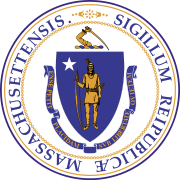- Commonwealth v. Kneeland
-
Commonwealth v. Kneeland 
Court Massachusetts Supreme Judicial Court Full case name Commonwealth of Massachusetts v. Abner Kneeland Date decided March, 1838 Citation(s) 37 Mass. 206 (1838) Case opinions Majority: Shaw
Dissent: MortonCommonwealth of Massachusetts v. Abner Kneeland was an 1838 Massachusetts state court case, notable for being the last time a court in the United States jailed a defendant for blasphemy.[1]
Contents
Overview
The defendant, Abner Kneeland, was a mercurial preacher who had been a Universalist, but had since converted to a form of pantheism. He published letters in which he expounded on his recently adopted pantheist philosophy, denying any God other than Nature as well as the uniquely particular divinity of Jesus Christ. Already a controversial figure, he was taken to court after he admitted having written these statements. The legal indictment was for "willfully blaspheming the holy name of God" and for his public disavowal of Christ. Though the statements used for the prosecution were written in 1833, delays and restarts of the trial meant that the final case was heard in 1838.
At trial, Kneeland raised three defenses of his actions:
- Kneeland claimed he never denied the existence of God, merely the existence of "a" God. Therefore he was not an atheist.
- The law itself was invalid and should be overturned, as it was in violation with the Massachusetts Constitution's guarantee of religious freedom.
- The law also violated the guarantee of freedom of the press.
The court was unimpressed with Kneeland's claims. It ruled that regardless of his beliefs, he had libeled God's name with malicious intent, rendering Kneeland's first point moot. As for the second, the court examined other state's colonial charters and pointed out that they too had reconciled blasphemy laws with guarantees of religious freedom, and that the law "was passed very soon after the adoption of the constitution, and no doubt, many members of the convention which framed the constitution, were members of the legislature which passed this law." Therefore, they must not conflict. The court dismissed the third claim out of hand, saying that if unlimited freedom of the press was allowed,
- the article in question become a general license for scandal, calumny and falsehood against individuals, institutions and governments, in the form of publication ... but all incitation to treason, assassination, and all other crimes however atrocious, if conveyed in printed language, would be dispunishable.
Kneeland was sentenced to sixty days in prison. In his support, a petition was put forward by for his pardon under grounds of free speech by William Ellery Channing, signed by various prominent people including Ralph Waldo Emerson and William Lloyd Garrison. However, a counter-petition was signed with even more signatures; Kneeland stayed in prison and served his entire term.
See also
- People v. Ruggles
- Blasphemy in the United States
- Blasphemy law in the United Kingdom
References
- ^ Levy, Leonard. Blasphemy in Massachusetts: Freedom of Conscience and the Abner Kneeland Case. (1973)
External links
Categories:- Massachusetts state case law
- 1838 in United States case law
- United States church-state separation case law
- United States free exercise of religion case law
- 1838 in Massachusetts
- 1838 in religion
Wikimedia Foundation. 2010.

